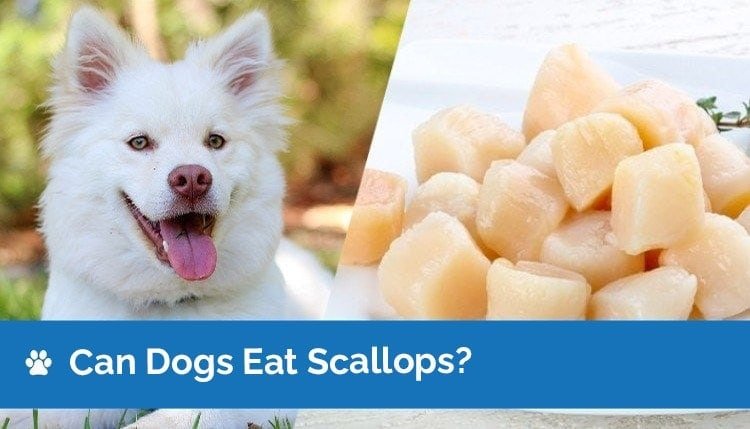
Can Dogs Eat Scallops? Yes, scallops are generally safe for dogs if they’re cooked properly. They can provide a nice source of protein and nutrients, but it’s important to avoid raw or fried scallops. Raw scallops carry a risk of bacterial contamination, and fried ones add unnecessary fats that aren’t good for your dog.
As with any treat, moderation is key. Too many scallops at once can cause digestive upset, so it’s best to offer them occasionally and in small amounts. Keep the preparation simple, and your dog can enjoy scallops safely! So, now let’s explore together- can dogs eat scallops?
Health Benefits of Scallops for Dogs
Can Dogs Eat Scallops? Scallops can be a nutritious addition to your dog’s diet when served properly. They offer several health benefits that support your dog’s overall well-being. Here’s a look at the key health benefits of incorporating scallops into your dog’s diet.
1. Rich in Protein
- Muscle Development: Scallops are high in lean protein, which is essential for maintaining and developing muscle mass. Protein supports muscle growth and repair, contributing to overall strength and vitality.
- Energy Levels: Adequate protein intake helps sustain your dog’s energy levels, supporting an active lifestyle and overall health.
2. Omega-3 Fatty Acids
- Skin and Coat Health: Scallops contain omega-3 fatty acids, which are beneficial for maintaining healthy skin and a shiny coat. Omega-3s help reduce inflammation and can alleviate skin issues such as dryness or itchiness.
- Joint Health: These fatty acids also support joint health, potentially reducing symptoms of arthritis or joint pain.
3. Essential Minerals
- Magnesium: Scallops provide magnesium, which is important for muscle and nerve function, as well as maintaining healthy bones.
- Potassium: This mineral helps regulate fluid balance, nerve signals, and muscle contractions, contributing to overall health.
- Phosphorus: Phosphorus supports strong bones and teeth and plays a role in energy production and cell repair.
By including scallops in your dog’s diet in moderation, you can offer these valuable nutrients that support muscle development, skin and coat health, and overall well-being. Always remember to prepare scallops properly and serve them as an occasional treat to ensure your dog reaps the benefits without any adverse effects.
Potential Risks of Feeding Scallops to Dogs
Can Dogs Eat Scallops? While scallops can be a nutritious treat for your dog, there are potential risks to consider. It’s important to be aware of these risks to ensure that scallops are a safe addition to your dog’s diet. Here’s an overview of the potential risks associated with feeding scallops to dogs.
1. High Sodium Content
- Seasoned or Processed Scallops: Scallops that are seasoned or processed may contain high levels of sodium, which can be harmful to dogs. Excess sodium can lead to dehydration, kidney strain, or hypertension.
- Health Risks: High sodium content may cause gastrointestinal upset, increased thirst, and frequent urination, which can be particularly risky for dogs with pre-existing health conditions.
2. Risk of Foodborne Illness
- Improper Cooking: Scallops need to be fully cooked to reduce the risk of foodborne illnesses caused by bacteria or parasites. Raw or undercooked scallops can carry harmful pathogens that may lead to gastrointestinal infections.
- Safe Preparation: To ensure safety, always cook scallops thoroughly by steaming, boiling, or baking them without added fats, salt, or spices.
3. Allergic Reactions
- Shellfish Allergies: Some dogs may have allergies or sensitivities to shellfish, including scallops. Symptoms of an allergic reaction can include itching, vomiting, diarrhea, or swelling.
- Monitoring: If you suspect your dog might be allergic to scallops, start with a small amount and monitor for any adverse reactions. Discontinue feeding scallops if any negative symptoms appear.
By being mindful of these potential risks and taking proper precautions, you can safely include scallops in your dog’s diet. Ensure scallops are prepared correctly and served in moderation to minimize health risks and provide a tasty, nutritious treat for your furry friend.
How to Safely Prepare Scallops for Your Dog
Can Dogs Eat Scallops? If you decide to include scallops in your dog’s diet, proper preparation is crucial to ensure their safety. Here’s how to safely prepare scallops for your furry friend to enjoy them without any risks.
1. Serve Plain, Boiled, or Steamed Scallops
- Avoid Seasonings: Always serve scallops plain, without any added salt, spices, or seasonings. Seasonings can cause digestive issues and are not suitable for dogs.
- Preferred Cooking Methods: Boiling, steaming, or baking scallops without added fats or oils is the best way to prepare them. These methods help maintain the scallops’ nutritional value while keeping them safe for your dog.
2. Ensure Scallops Are Fully Cooked
- Eliminate Bacterial Risks: Cooking scallops thoroughly helps kill any harmful bacteria or parasites that might be present in raw or undercooked seafood. This reduces the risk of foodborne illnesses.
- Check for Doneness: Make sure the scallops are opaque and firm to the touch, indicating they are fully cooked.
3. Cut Scallops into Bite-Sized Pieces
- Prevent Choking Hazards: Cut scallops into small, manageable pieces, especially if your dog is small or tends to gulp food quickly. This helps prevent choking and makes the scallops easier for your dog to chew and digest.
- Size Matters: Adjust the size of the pieces based on your dog’s size and chewing ability to ensure safety.
By following these preparation tips, you can safely incorporate scallops into your dog’s diet as an occasional treat. Proper preparation helps avoid potential health risks and ensures your dog enjoys this nutritious seafood safely.
Signs of Allergic Reactions or Digestive Issues
Can Dogs Eat Scallops? While scallops can be a healthy treat for your dog, it’s important to monitor them for any signs of allergic reactions or digestive issues. Here’s what to look out for and what to do if you suspect your dog is having a negative reaction.
1. Watch for Common Symptoms
- Vomiting: If your dog starts vomiting after eating scallops, it could indicate a sensitivity or allergy to shellfish.
- Diarrhea: Loose stools or diarrhea can be a sign that scallops aren’t agreeing with your dog’s digestive system.
- Itching: Excessive itching or skin irritations may signal an allergic reaction to the scallops.
2. Consult a Veterinarian
- Professional Advice: If your dog shows any of the above symptoms or if you suspect food sensitivity, it’s best to consult your veterinarian. They can help determine the cause and recommend the appropriate treatment.
- Severe Reactions: For severe or prolonged reactions, such as persistent vomiting or diarrhea, seek veterinary care promptly.
3. Discontinue Feeding if Adverse Reactions Occur
- Stop Offering Scallops: If your dog experiences any negative reactions after eating scallops, stop feeding them immediately to prevent further issues.
- Reevaluate Treats: Consider alternative treats or foods that are known to be safe for your dog, and monitor their response to new foods carefully.
By being vigilant and responsive to any changes in your dog’s health after eating scallops, you can help ensure their safety and well-being. If any adverse reactions occur, taking prompt action will help manage and resolve any issues.
Alternatives to Scallops for Dogs
Can Dogs Eat Scallops? If you’re looking for alternatives to scallops for your dog, there are several safe and nutritious options to consider. Here’s a guide to some great alternatives that can offer similar benefits without the potential risks associated with scallops.
1. Safer Seafood Options
- Salmon: Rich in omega-3 fatty acids, salmon supports skin, coat, and joint health. Ensure it is fully cooked and free of bones before serving.
- Whitefish: A mild-flavored, low-fat fish that is easy on the stomach and can be a good alternative to scallops. Like salmon, it should be cooked and deboned.
2. Lean Meats
- Chicken: A lean source of protein that promotes muscle health and is generally well-tolerated by dogs. Serve it plain, without any seasoning or sauce.
- Turkey: Another lean meat option, turkey provides high-quality protein and can be a good substitute for scallops. Make sure it is fully cooked and free from any added ingredients.
3. Vet-Recommended Dog Treats
- Commercial Dog Treats: Opt for treats that are specifically formulated for dogs and have been tested for safety and nutritional value. These treats are designed to meet your dog’s dietary needs and are a reliable option.
- Healthy Chews: Consider natural chews like carrots or dental chews that can provide additional benefits for your dog’s dental health.
By choosing these alternatives, you can ensure that your dog enjoys a variety of safe and nutritious foods. These options offer similar benefits to scallops, such as high-quality protein and essential nutrients, while minimizing the risk of adverse reactions.



